Best-Selling Parenting Expert Reveals a Counterintuitive Approach to Help Your Kids Create Healthy Screen Time Habits – in 18 Days (or Less)
These ScreenGuard Strategies Will Prevent Excessive Use of TikTok, YouTube, Games and Cartoons. Prevent Or Break Screen Addiction and Get Your Kids Off Screens And Into “Real Life”.
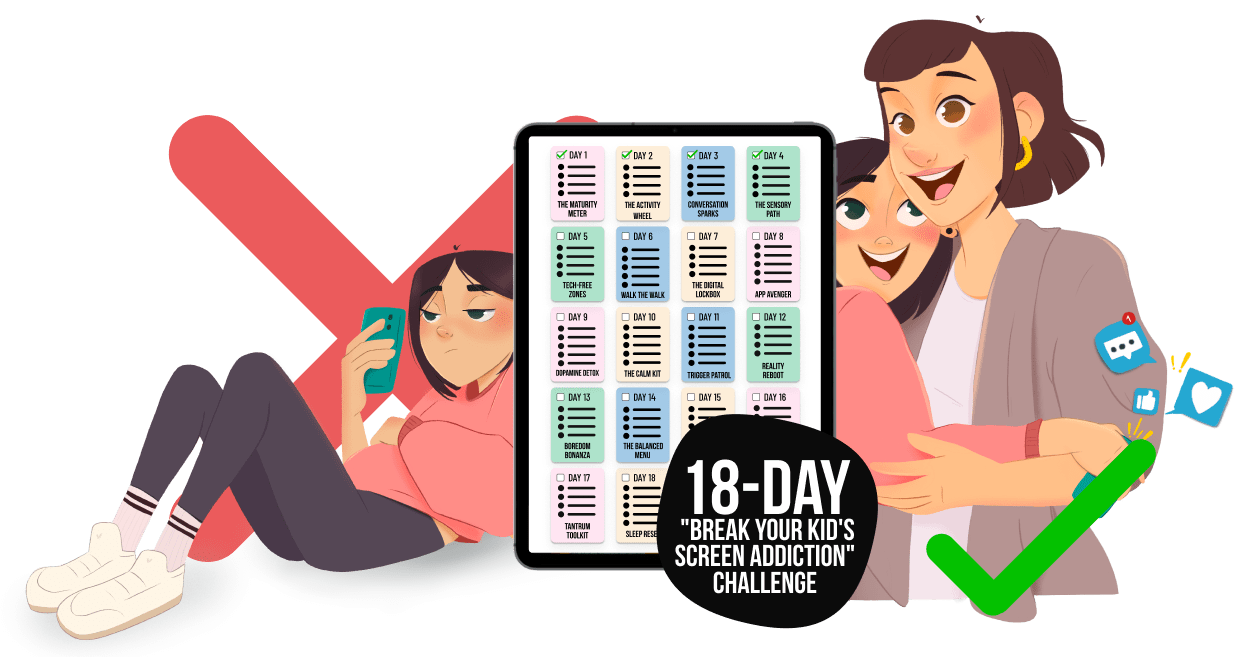




- 18 Unique ScreenGuard Strategies: prevent technology addiction and developmental consequences of excessive screen use
- 18 Daily E-mail Lessons: manage screen time use in a calm, peaceful and collaborative way with simple action steps
- Concrete Instructions With Practical Examples for quick & easy ways to get your kids off screens and into real life
- Daily Reminders and Tips to help you create healthy screen time habits in 18 days (or less)
- Field-Tested Parenting Techniques based on science, 40+ years of experience and working with 100,000+ kids
- Try The FULL Challenge 100% Risk-Free with our 90-day no-questions-asked money-back guarantee
- Lifetime Access to all the materials, worksheets and bonuses
- 5 FREE BONUSES (FUNtastic guide, Avoid Parental Burnout ebook, Strong-Willed Kids Manual, Happiness Token System, Backtalk Remedies ebook) – Total Value $137


Get Instant Access to the 18-Day “Break Your Kid's Screen Addiction” Challenge!




What Is The 18-Day “Break Your Kid's Screen Addiction” Challenge?
Numerous clinical studies show that screens increase depression, anxiety and aggression.
Due to the addictive mechanisms that the “big tech” companies have built into their apps, children have a hard time getting away from their screens…
Everything that doesn’t flash, glow and move fast seems “pointless”…
Your child shakes and freaks out when you take a smart device out of their hands or try to restrict their use of it …
As kids’ self-control mechanism is not fully developed yet, they have no chance to resist these algorithms.

There is another problem with all this.
The negative effects of excessive screen use are NOT immediately obvious.
You usually only notice the consequences when your child has already developed certain developmental problems.
For example, problems with concentration, restlessness, apathy, aggressiveness, excessive weight, lack of social skills (to name just the most common ones).
The 18-Day “Break Your Kid’s Screen Addiction” Challenge is designed to empower parents to help their kids develop a healthy relationship with technology and media.
Over the next 18 days, you will learn how to:
- Reduce the amount of time your child spends in front of screens
- Keep your child away from screen addiction
- Prevent the lasting damage that screens leave on a child’s brain
- Get your child interested in the real world – friends, hobbies, play
Without:
- ❌ Banning all technology and leaving your child unprepared for the digital world
- ❌ Lecturing or punishing your kids
- ❌ Overwhelming yourself with complex parental controls you don’t understand
- ❌ Excessive monitoring or loss of trust between you and your child
And you’ll benefit too – your child won’t have to be nagged to do other things than sit in front of screens.
At the same time, you won’t suffer the guilt of having a child who suffers from screen addiction.
This isn’t about radically changing your family dynamics or implementing rigid, unrealistic rules.
The 18-Day “Break Your Kid’s Screen Addiction” Challenge provides clear, incremental steps tailored for busy parents who care about raising healthy, balanced kids in the digital age.
Here are a few of the parents and what they've been able to accomplish with my Transformation Challenges
“These are the parenting strategies I’ve been looking for. Of all the parenting books and advice online that I have read, Strategic Parenting is the most useful, practical, and easy to follow. And so far it’s working! It’s only been 9 days so far, but the interactions I’ve had with my children have been so positive. So far so good!”
“I’ve enrolled myself in so many workshops, read hundreds of books on toddlergood parenting psychology brain science… this one hits home. In just a week I’ve not once lost my calm. I use to lose it almost everyday. My 3 year old is listening to me and doing whatever I say with love and respect. I love this. It really is fun light and easy to follow. I actually can’t wait for the next days email! THANK YOU!”
Here’s everything you’ll get if you join the 18-Day “Break Your Kid’s Screen Addiction” Challenge TODAY
Steer your child away from cartoons, playing games and scrolling through Instagram and TikTok without causing a fuss or a fight.

During the 18-day challenge, you will receive one email each day in your inbox containing one ScreenGuard Strategy.
The solutions found in these educational emails will take no more than 5 minutes a day, which is nothing compared to the time and energy you spend every day fighting over your phones, tablet and computer.
In 18 days, you will learn about the following ScreenGuard Strategies:
CHAPTER 1: Screen Time Foundations
This chapter focuses on laying the groundwork for digital responsibility and encouraging a balanced relationship with technology.
Day 1 – Tech Test: Use this tool to foster maturity and ensure you never have a hard time setting limits for screen time. (Includes printable: Maturity Test)
Day 2 – Smart Trust: Build a foundation of trust and responsibility with your child, ensuring they navigate the digital world safely. (Includes printable: Phone contract)
Day 3 – Timeout Station: Stop relying on your kids’ self control. Make your home a balanced environment that promotes healthy screen habits and strengthens family bonds.
Day 4 – Take a Break: Reconnect and create lasting memories with your child, free from digital distractions.
Day 5 – Boredom Blues: Equip your child with endless real-world activities, reducing screen time and enhancing family bonding. (Includes printable: Boredom Jar)
Day 6 – Digital Delay: Teach your child the value of responsibility and privileges, leading to better habits and less screen dependency.
CHAPTER 2: Navigating the Digital Landscape
This chapter delves into the challenges and opportunities of the online world, emphasizing safety and the importance of genuine connections.
Day 7 – Internet Guardians: Safeguard your child’s online journey, ensuring they explore the digital world safely and responsibly.
Day 8 – Sneaky Ways: Stay one step ahead of your tech-savvy child, ensuring they navigate the internet safely and understand its implications.
Day 9 – FOMO Factor: Effectively handle “But mom, all my friends are using it!” and empower your child to rise above peer pressure.
Day 10 – Off the Grid: Cultivate a balanced digital life for your child, blending screen time with real-world fun.
Day 11 – Parenting Offline: Lead by example and show your child the joy of being present in the moment.
Day 12 – Disconnection Connection: Unlock your child’s social potential and develop genuine friendships beyond the screen.
CHAPTER 3: Enhancing Real-World Connections
This chapter emphasizes the importance of quality screen time, sensory-rich experiences, and fostering genuine interactions for holistic development.
Day 13 – Beep Beep: Set up the technology to work for your kids, not against them.
Day 14 – Brain’s Melody: Boost your child’s cognitive, motor, and social skills through sensory-rich experiences that don’t include screens.
Day 15 – Watch & Learn: Empower your child with quality screen content, turning screen time into a valuable learning experience.
Day 16 – Virtual Autism: Reconnect with your child, pulling them out of the screen-induced haze and fostering genuine interactions.
Day 17 – Focus Jedi: Use these 4 simple steps to transform your child into a focused learner, mastering the art of attention and excelling in school.
Day 18 – Sleepyheads Wide Awake: Establish a peaceful screen-free bedtime routine, ensuring your child wakes up refreshed and ready for the day.
As soon as you join the 18-day challenge, you will start receiving e-mails with ScreenGuard Strategies.
For the next 18 days, you will receive one email every day.
In addition to the educational content, these emails will also provide you with a daily kick in the butt to ensure you don’t give up or lose motivation during the challenge.
The guidance in the form of e-mails also gives you the freedom to choose when to read the learning episodes.
If you can’t make it in the morning, you can read them anywhere, anytime – on the bus, on a break at work or while chatting with a friend.
By following the advice I’ll share with you in these 18 days, you’ll notice changes in your child’s attitude towards smart devices in the days to come. They will find it easier to ‘unplug’ and use them much more responsibly and safely.
PLUS, 5 FREE BONUSES – Today Only ($137 Total Value)

FUNtastic guide: Give your kids an unforgettable screen-free adventure with 100 unique, interesting and educational ideas for quality evenings, weekends and holidays with the family
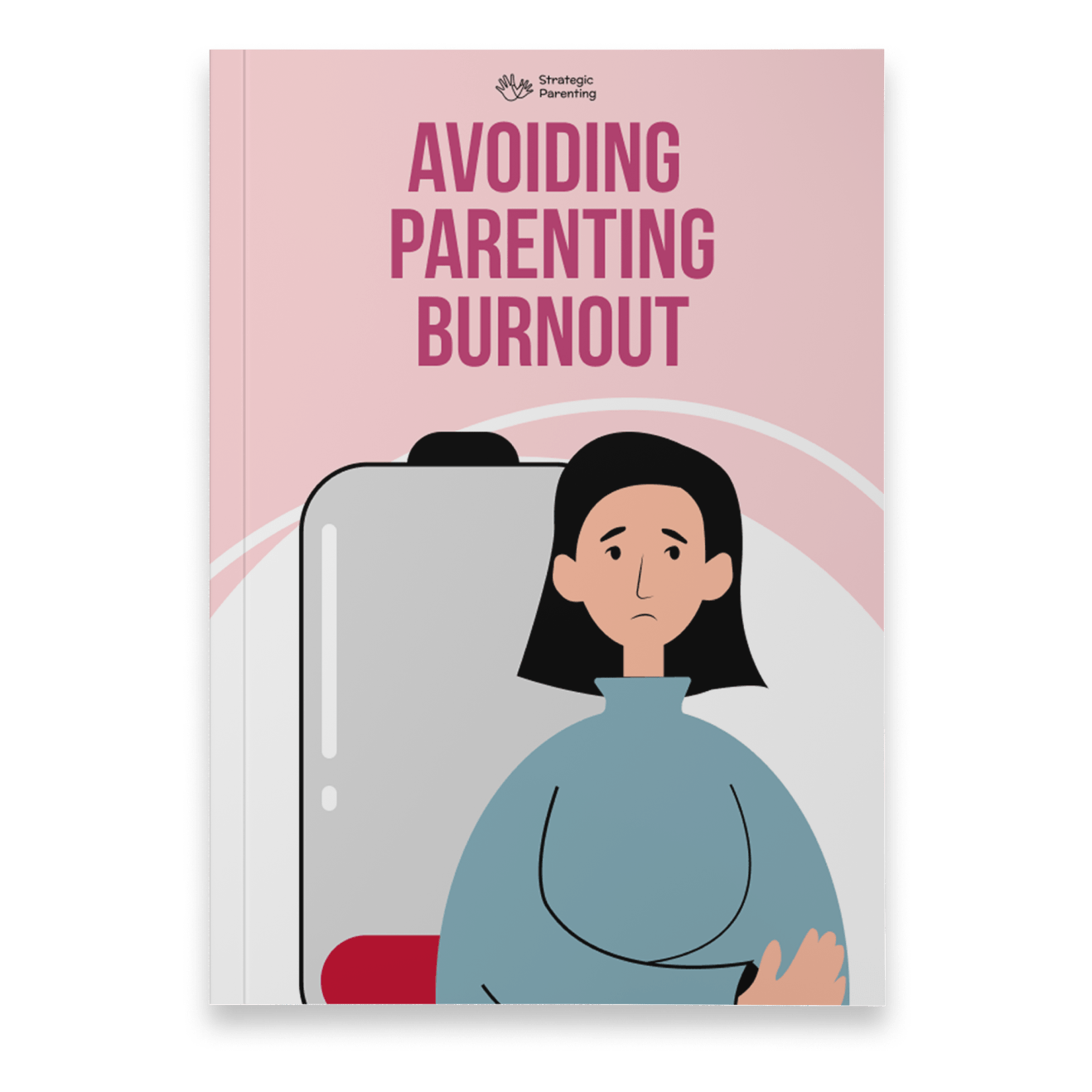
Avoiding Parenting Burnout (Guide): make your well-being a priority again. Spot and prevent the emotional exhaustion caused by the chronic stress of parenting, so you can be the best parent you can be.
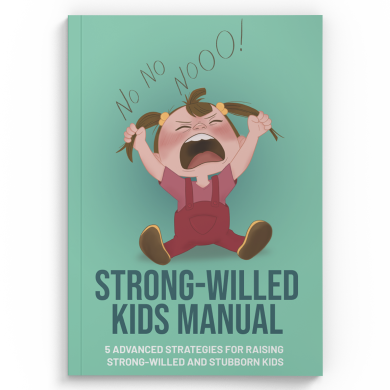
Strong-Willed Kids Manual (E-Book): 5 Advanced Strategies For Raising Strong-Willed And Stubborn Kids

Happiness Tokens System (Printable): Stop Your Kids From Misbehaving In Less Than 7 Days
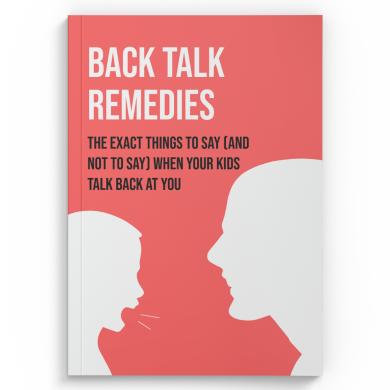
Back Talk Remedies (Word-for-Word Scripts): The Exact Things To Say (And Not To Say) When Your Kids Talk Back At You

The shocking stories of excessive screen time (please don’t make the same mistake)
I keep hearing heart-breaking stories of parents who acted too late and are now struggling with the consequences of their kids’ full-blown screen addiction:
“My son has been acting violent lately. He has started to call me words like w***e, h***r, b***h and other insulting words. He is only 8 but plays the violent game called “Grand Theft Auto”. And when I tell him to stop he gets all mad and once even broke our television.”
“My child is so addicted to her iPad, for the whole day she only watches videos and plays online games. Even while eating her iPad is with her watching video streaming games. When I confiscate the iPad she throws a tantrum or stops talking to me and stays only in her room.”
“I asked [my son] to come for his shower once he had finished [playing the game]. He stormed upstairs and proceeded to yell at me ‘No one asked me to come for a shower, I only had 10 minutes to play my game all day, you stupid idiot’, then punched me with full force.”
“All my 6 year old cares about is Youtube and my 3 year old, Roblox. I feel like an absolute failure and just exploded on my 6 year old and unplugged the TV. I’m failing my kids with my temper and their screen time.”
I’ve been working with kids for over 40 years now, but this is a completely new phenomenon that we’re experiencing in recent years.
I believe this is the new pandemic of our time, and many parents feel powerless, not knowing what to do about it.
Technology is so addictive that even its creators don’t allow their kids to use it
Games offer a never-ending source of new adventures, levels and rewards.
TikTok and Instagram have an infinite feed of entertaining videos.
YouTube and Netflix automatically move on to the next video.
It doesn’t take a genius to notice that technology was purposefully designed to be addictive.
Of course, that’s not surprising. Each additional second of screen time means more money going into the bottomless pockets of the Big Tech companies behind these devices and apps.
So it should come as no surprise when you hear that the world’s greatest tech leaders are also the greatest technophobes.
In late 2010, months after the first iPad was released, Steve Jobs (founder of Apple and creator of the iPad) told New York Times journalist Nick Bilton that his children had never used the iPad.
Bilton also discovered that Chris Anderson, the former editor of Wired (a magazine focused on emerging technologies) enforced strict time limits on every device in his home, “because we have seen the dangers of technology firsthand.”
Evan Williams, the founder of Twitter, Blogger, and Medium, bought hundreds of books for his two young sons. But he refused to give them an iPad.
It seems as if the people behind these products are following the fundamental rule of drug dealing: never get high on your own supply.
Speaking of drug dealing…
The scientists made it crystal clear: “It’s digital heroin”
Recent brain imaging studies conclusively show that excessive screen exposure can neurologically damage a young person’s developing brain in the same way that drug addiction can.
Screens affect the kids’ brain’s frontal cortex, controlling impulse control like cocaine does.
Technology is so hyper-arousing that it raises dopamine levels — the feel-good neurotransmitter most involved in the addiction dynamic — as much as sex.
This addictive effect is why Dr. Peter Whybrow, director of neuroscience at UCLA, calls screens “electronic cocaine” and Chinese researchers call them “digital heroin.”
No wonder kids are agitated when screen time ends.
Numerous clinical studies show that screens increase depression, anxiety and aggression
A recent study, using data from the ABCD Study® (the largest long-term study of brain development and child health in the United States) has shown that more than 2 hours of screen use per day was associated with an increased risk of having a depressive disorder, anxiety, suicidal thoughts/attempts, and self-harm.
In 2021, Denise Scairpon published a dissertation on screen time among 4- and 5-year-old children. She found that excessive use of digital devices may cause children to suffer irreversible damage to their developing brains and limit their ability for school success.
Other clinical research correlates screen time with disorders like ADHD, addiction and emotional dysregulation.
In extreme cases, it can even lead to psychotic-like features where the video gamer loses touch with reality.
In toddlers, studies have shown that excessive screen time can have a negative impact on language development, delayed social development, sleep patterns disruption and limited ability to think creatively and problem-solve.
But it doesn’t end with your child’s brain development and “hidden” psychological issues…
Then there’s stranger danger, cyberbullying, privacy concerns, and so on…
We’ve all seen horror stories in the news about kids meeting strangers online…
As it turns out, one in five US teens say they have received an inappropriate request from strangers.
But it’s not just strangers, it’s also friends and peers…
Cyberbullying risk increases with each additional hour of screen use.
Study participants who played single-player video games had a 14% greater chance of being cyberbullied for each additional hour of game time.
And, of course, there are privacy issues that even adults can’t always avoid, let alone our kids.
Just in April 2023, TikTok was fined a whopping £12.7M ($15.7M) by the UK’s data watchdog for illegally misusing children’s data.
All of the above is why I feel so passionate about this topic.
I believe it’s the biggest threat to today’s youth.
And that’s why, as you can probably tell, I’ve been researching in depth what are its consequences as well as potential solutions.
And that’s what I want to share with you today on this page.
It starts slow and innocent… and before you know it it’s out of control
When I speak to parents they often tell me that they were initially not aware of how bad screens can be until they started noticing the sudden drastic changes in their kids’ behavior.
Other parents were aware of some of the dangers that technology poses to their little ones, but an unfortunate sequence of events led them to allow their kids too much screen time.
Perhaps they moved to a new area where their child had no friends.
Or they had a period of a few weeks when they were extremely busy and tired.
Or maybe it was during the covid lockdowns.
Perhaps they just saw it as the only option to keep the child calm at a restaurant, grocery store or on longer rides with public transportation.
And before they knew it, their kids were hooked.
Their world shrinks into a glowing rectangle
As one mother wrote:
“We got him an iPad and it began great. Puzzle games and tracing numbers and letters with videos only during car rides…”
“Throughout time it’s gotten out of control. Taking it away and restricting times results in ungodly tantrums. He becomes physical, screams and runs away screaming hurtful words…”
“I feel awful for letting it get this out of control, he has no interest in anything else.”
Another mother says:
“My son just wants to be on his iPad and phone from sun up to sun down…”
“He doesn’t want to do anything other than screens. He hates when we make him leave the house with us and complains the entire time…”
“He will legit be on the iPad from 10am to 12am. Help!”
While previous generations spent time outside, running around, developing their motor skills, social skills and cognitive abilities…
Today’s kids often spend time in their bubbles, cut off from the real world.
You find them immersed in the online world, with people you never met in places you’ve never seen before.
“But mom, all my friends are using it!”
The older kids get, the more difficult it is to limit or even monitor their use of technology.
As they enter their teenage years, peer pressure gets stronger and stronger.
If you’re a parent of a teenager, then words like these may sound familiar:
“Everyone uses TikTok. No one has screen time limits. It’s embarrassing. I feel left out. It’s unfair. Only people with crazy parents do this!”
If you have a toddler then you’re not there yet.
But as technology is getting increasingly more integral to everyone’s life I’m sure that with your kids it won’t get any easier.
And while you want to protect them, to some degree you have to agree with them…
Do not deprive them of what their peers experience
We’re in the 21st century after all, so you can’t completely cut them off from technology.
Some parents are concerned that their kids won’t fit in with their peers if they’re not allowed to watch the same shows, use the same apps and play the same games.
And the concerns are valid… as one parent recently shared:
“My homeschooled cousins do not have the shared lived experience of most of their peers and it affects them deeply as adults.”
It’s a parent’s job to safely expose technology to children at age-appropriate times
Sheltering them too much can be a massive disservice to the child.
This has also been confirmed by the science.
Research using data from the ABCD Study® (the largest long-term study of brain development and child health in the United States) has shown both positive and negative associations of screen use.
A study led by physician Pierre-André Michaud, MD, of the Institute of Social and Preventive Medicine in Switzerland, observed the best mental and physical health in adolescent kids with moderate use of the internet.
Jon Lasser, PhD, a psychologist at Texas State University and co-author of a book on kids’ excessive screen time, says:
“It’s important for kids to develop the capacity to self-regulate. Parents who try to micromanage screen time may inadvertently interfere with that self-regulatory development.”
So this is when things get confusing for many parents…
How much is too much and to what extent should you get involved?
10 signs your kids may have a screen addiction
Ideally, you start correctly regulating your kids’ screen time as soon as they get in touch with any kind of screens.
That will prevent any chances of addiction in the first place and hopefully you’re not too late for that yet.
But just to make sure you’re prepared, let’s have a look at what signs of screen addiction look like.
Your child may have screen addiction if they exhibit any of the following behaviors:
- Constantly asking to use screens
- Refuse to get off screens and throw tantrums
- Easily bored when they don’t have access to screens
- Love using screens more than doing anything else
- Find the digital world more interesting than the real world
- Check their device (or ask for one) first thing in the morning
- Become apathetic towards chores, school work, and fun activities
- Take their device to the bathroom
- Are on their devices during meal time
- You need to constantly negotiate screen time with them
So, if you think your kids may be addicted, I hope we can together get through this, with the help of the ScreenGuard Strategies that I’ll present to you on this page.
Once a kid has crossed the line into true tech addiction, treatment can be very difficult
Even if you think your child is not addicted, I encourage you to keep reading what I have to say on this page.
Healthy screen time habits are significantly easier to establish sooner rather than later…
As crazy as it sounds, some psychiatrists report that it is easier to treat heroin and crystal meth addicts than addicted video gamers or social media addicts.
This is why Dr. Peter Whybrow, Director of Neuroscience at UCLA, calls computers “Electronic Cocaine” for the brain.
So, I hope you’ll get ready before it’s too late.
The top 6 screen management mistakes most parents make
As I’ve been working with hundreds of families 1 on 1 over the recent years, I noticed the same patterns across many of them.
Here are the top 6 screen management mistakes that I noticed most parents make:
1. Lack of Guidelines or Rules: Many parents do not set clear guidelines about screen time, leading to inconsistent habits.
2. Inconsistent Enforcement: Even when rules are set, parents often fail to enforce them consistently. This sends mixed messages to children and makes it harder to instill good screen habits.
3. No Monitoring of Content: Not all screen time is created equal. Educational apps and quality programming can be beneficial. But many parents do not monitor what their children are watching, playing, or interacting with online.
4. Using Screens as a Babysitter: It’s easy to hand over a tablet or turn on the TV to keep kids occupied. However, using screens as a digital babysitter is one of the main reasons for excessive screen time.
5. Not Modeling Good Behavior: Parents who are themselves glued to screens set a poor example for their children.
6. No Time for Co-viewing or Co-playing: Parents often miss the opportunity to use screen time as a bonding activity.
Now, I’m not saying you have to avoid all of the above to prevent screen addiction.
You just need to learn how to get your kids to develop healthy screen time habits, set healthy boundaries AND teach them the vital skills to thrive throughout their lives.
Only YOU have the power to prevent your kids’ excessive screen time
You have a choice to make.
You can choose to ignore the advice on this page and let screen time dominate your family’s life…
Or, you can take action today to manage it better.
Excessive screen time doesn’t have to be a constant in your family.
You don’t have to let screens be the only way to keep your kids occupied.
You CAN find a way to balance screen time with other healthy activities…
You CAN feel like you’re the most responsible parent you can be…
You CAN raise well-rounded and successful kids you’re proud of…
And you CAN enjoy every single moment of your parenting journey.
“I don’t have time to entertain my kids 12 hours a day”
First of all, let me say that in my opinion, as someone who’s been working with kids for over 40 years, children need to be bored sometimes.
It’s a part of life. It takes their brain on their own journeys. It develops their creativity and imagination.
If you start solving boredom by giving them their device to play with, kids will quickly learn that being tired or bored will help them get their hands on that screen.
Bust sometimes you really need them to be occupied with something, so what else can you do?
Well, there are many things that I’ve seen work very well, but let me name just three of my favorites:
1. Include them in your activities: Kids love doing adult things. And if you properly set it all up and introduce them to what you’re doing, they’ll often love to just be with you and help you.
2. Set up sensory-rich stations: These are simple and fun activities where kids move through a full range of motion instead of staring at the screen. It could be playdough with essential oils. Or building a mud kitchen. Or setting up a puppet show. Or creating sensory bottles with water, glitter and beads.
3. Set up a Boredom Jar: This is a collection of 100 simple and interesting activities for kids. You can buy one or make one yourself. Typically, as soon as the kid picks an activity, they start making plans on how to solve it, where to get the tools, whom to ask…
In either case, my point is this – there are countless ways to keep kids entertained without screens.
You just need to know what they are, and I’ll talk more about them further down on this page.
When you start using ScreenGuard Strategies, magic happens
Once you start using ScreenGuard Strategies (which I’ll tell you more about in a minute)…
You’ll likely start noticing the first results within days.
Less screen time, fewer tantrums and fewer anger issues.
Increasingly more interest in the real world, more creativity, more joy, more motivation to join you in your activities.
Imagine going to your kid’s soccer game.
Every other sibling of the other players is on their tablet or on their parents’ phones.
But your kid is cheering for their sibling and talking with you the whole time.
They love dinner conversations.
They love sitting around the table and playing games.
Or going outside to play.
They only spend 15 minutes on their tablet, without any screen time restrictions.
They would just rather be outside or doing something.
They’re in the advanced programs at school and are a straight-A student.
They have great social skills and are liked by teachers and peers alike.
Does this sound like a story from a few decades ago?
It’s not. That’s how an actual father with healthy screen time habits described his family’s day-to-day life just a few weeks ago.
Or in another parent’s own words:
“Our young kids are almost totally screen free — but honestly we’re seeing the benefits. Our oldest is just a super happy, curious, physical, well-adjusted kid and everyone talks about how nice he is to be around. So many of the other kids we know just constantly pester their parents for screen time and our kids have never once asked for it.”
Science, again, confirms such stories.
Gary Goldfield, PhD, a psychologist at the University of Ottawa, consistently found the best mental health and cognitive outcomes in teens who do one hour of physical activity each day, sleep 8 to 10 hours a day and use screens recreationally less than two hours a day.
And this is all attainable to you right here on this page!
Other parents will stare at you in awe
They’ll wonder:
“How do they manage it?”
“How are their kids so engaged without screens?”
“What’s their strategy?”
And you’ll simply lean back in your armchair and smile.
You’ll know you’ve guided your kids toward a balanced and fulfilling life…
You’re no longer anxious about excessive screen time every day…
You finally feel like you’re providing your kids with a well-rounded upbringing – and they value it.
And you notice that parenting is surprisingly easier without screen policing.
It’s not your fault that screen time has become an issue
Many parents tell me that they have no affordable alternative entertainment for their kids.
Others are simply exhausted and need some time for themselves.
Or they need to get things done around the house.
And, of course, screens are often the first solution that comes to mind.
Technology is a relatively new phenomenon and no one warned you about its consequences.
No one prepared you for how to be a parent in today’s world.
But that stops today!
Why I feel so passionate about this problem…
I’m Marko Juhant, and I’ve been working with kids for the past 40 years.
But something strange started happening in the recent years of my career.

I come from Slovenia (a small country in Europe), which is why you might not have heard of me yet.
I started out as a teacher on a school campus…
Quickly graduated to a principal position at a school for “challenging” kids…
The kids were incredibly difficult to work with. They threw things at me, yelled at me, tried to manipulate me…
And yet I think today, working with kids is more difficult than it was for me back then.

I developed a strong passion for child psychology to understand and guide our little ones.
I started hosting workshops at schools.
Right now, I do about 500 workshops every year, where I help teachers and parents with their unique challenges – even though I’m in my 60s.

When parents at workshops started asking me to give them something they could read at home, I started writing books.
I ended up writing 16 parenting books, most of which topped the national bestseller lists in Slovenia and competed with titles like Harry Potter.

Over the past 40 years, more than 100,000 parents and teachers read my books or listened to my lectures.
Which is quite a lot, since my country Slovenia only has about 800,000 parents.

This created a ripple effect throughout Europe.
All of a sudden, journalists from Switzerland, Germany, Austria, Italy and Croatia started interviewing me, and parents and teachers from all over Europe started reaching out to me for help.
I wanted to help – so I learned new languages just to be able to share my knowledge with them.
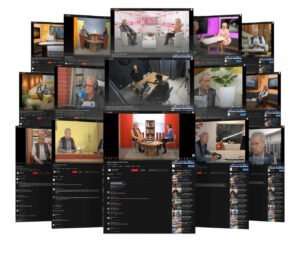
Over the years, I also worked with over 1,000 European families 1on1 that came to me as “their light at the end of the tunnel”.
I came into their home, worked with the parents and kids for a week, and solved their challenges.
“How is life without screens even possible these days?”
Remember, for the vast majority of human history, screens were non-existent.
People connected through face-to-face conversations, read physical books, played outdoors, and engaged in hands-on hobbies.
While the world has changed, we sometimes forget that life without screens was – and therefore still is – possible.
Besides that, it’s not about completely eliminating screens, but rather about finding a balance.
In the last few years, some academics have been suggesting we talk more about screen quality than screen time.
This includes for example ‘co-viewing’, which stresses the importance of engaging with what your children are viewing along with them.
Excessive screen time is concerning, but when used for education, it can be beneficial.
Finally, and perhaps most importantly, it’s about teaching your kids about mindful screen usage through their own experience.
And especially guiding them to replace screens with other activities.
And once you get your kids to self-regulate healthy screen time, you might be like this mother. When asked how she sets screen time limits, she answered:
“I don’t need to, we’re too busy doing art, reading books, playing outside, dancing to music, playing with toys, using our imaginations, baking, learning, and exploring nature.“
How the ScreenGuard Strategies were born
Due to the addictive mechanisms that the “big tech” companies have built into their apps, children have a hard time getting away from their screens…
Everything that doesn’t flash, glow and move fast seems “pointless”…
Kids shake and freak out when you take a smart device out of their hands or try to restrict their use of it…
And it’s not their fault.
This is why, over the last decade, I had more and more parents coming to me for advice about screen addiction.
So I put my head down and set to work. I sifted through dozens of research papers on screen addiction. I researched all the recommended solutions.
I spent hundreds of hours learning from my mentors. Reading all sorts of different books on the topic.
And then I combined this with my existing deep understanding of child psychology and my 40 years of experience working with kids, parents and teachers.
I tested all the different approaches to see what works and what doesn’t.
Over time, I developed my own unique ScreenGuard Strategies that helped me predictably get kids to create healthy screen habits.
I’ve been able to test this most recent and most effective version of it on thousands of kids, and it’s astonishing how quickly and reliably it works.
ScreenGuard Strategies: The ultimate solution for healthy screen time habits
ScreenGuard Strategies are tools that help you guide your child’s digital habits without resorting to threats or punishments.
They’re simple, effective, and easy to use.
With them, you’ll never feel out of control.
You’ll never have to resort to taking devices away in frustration.
Because you’ll always have a proactive approach – and because it will work.
To help you manage your child’s screen time, I developed a comprehensive screen-time management toolbox that helps you navigate the major screen-time challenges.
You’ll confidently use them when it’s time to:
- Set boundaries for device use.
- Encourage offline activities.
- Transition from screens to bedtime routines.
- Leave the house for outdoor activities.
- End digital playtime and focus on chores.
- Prioritize study and homework over screens.
…and in countless other situations.
And today, I’m excited to share them with you.
So today, you’ll get to discover the effectiveness of these screen-time management tools as well.
Without further ado, I’d like to introduce you to…
The 18-Day “Break Your Kid’s Screen Addiction” Challenge
The screen-time management toolbox that will guide your kids to BALANCE without threats or punishments.
This isn’t a challenge where you simply limit screens for 18 days.
This challenge will teach you how to manage screen time effectively for life.
Over the next 18 days, you will:
- Guide your kids to engage in offline activities without resorting to threats
- End the endless screen-time through effective management tools
- Create deeper connections through tech-free parenting techniques
- Use a constructive and sometimes playful approach to encourage offline engagement
- Stop being the “crazy screen-limiting mom/dad”
Over the next 18 days, you’ll receive a daily e-mail with one ScreenGuard Strategies – a specific technique from the toolbox that will help you guide your kids towards a balanced digital life.
All in a respectful, harmonious, and effective manner, without inducing feelings of deprivation or causing power struggles.
And because you’ll receive an e-mail (that’s a quick read) from me every day, you’ll be able to implement the tools immediately.
The 18-day challenge includes:
- Brief insights to help you understand your kids’ digital needs and desires
- Concrete solutions for real-world challenges, helping you replace excessive screen time
- Practical instructions that will help you use the techniques the same day
In essence – you’ll have all the resources you need to achieve screen-time balance within 18 days (though many parents have told me they saw improvements much sooner).
Join thousands of parents in the Strategic Parenting community
My parenting challenges have been tested by tens of thousands of parents all over the world.
Here’s what some of them said:

 Verified customer
Verified customer

“It’s fun. I love how Marko describes a situation, the background and a solution. I’m really grateful for these lessons because I tried courses, coaching, reading about the topic, but I only collected ideas and knowledge, not practical solutions. It’s working for us.”

 Verified customer
Verified customer

“Marko Juhant is an excellent educator. Very realistic. I think every kid would need parents with his view on parenting.“

 Verified customer
Verified customer

“I use a lot of tips from Mark Juhant’s courses and they really work. In the course, he addresses the specific problems and instills in you a feeling of trust and understanding.”

 Verified customer
Verified customer

“I can tell there is more mutual kindness, calmness and compassionate conversation in our family. Above all, I learned how to listen to my daughter first and then later tell her my opinion. We talk more, come to an agreement much easier and also stick to the agreement, which before was not often the case. Your expertise is definitely useful to me and we are slowly putting it into practice in our everyday life.”

 Verified customer
Verified customer

“Your advice was practical, fun, and easy to understand. You can really see that the knowledge comes from experience and that gives you the confidence to apply it to raising your kids.”
“These are the parenting strategies I’ve been looking for. Of all the parenting books and advice online that I have read, Strategic Parenting is the most useful, practical, and easy to follow. And so far it’s working! It’s only been 9 days so far, but the interactions I’ve had with my children have been so positive. So far so good!”
“I’ve enrolled myself in so many workshops, read hundreds of books on toddlergood parenting psychology brain science… this one hits home. In just a week I’ve not once lost my calm. I use to lose it almost everyday. My 3 year old is listening to me and doing whatever I say with love and respect. I love this. It really is fun light and easy to follow. I actually can’t wait for the next days email! THANK YOU!”
“The materials are worth buying. Applying the advice in my family has really helped to improve my family’s life. It’s not magic, just some rationally based advice to be applied in our daily lives. And they do work!
P.s. customer support works great. There was some glitch in their page and i didn’t receive inatant access. I addressed them via email and everything was solved the same day.”
Who is the 28-day challenge right for?
The challenge is right for you if…
- You’re a parent of a toddler or a teenager with possible screen addiction: If you want your kids to have a balanced digital life without constant negotiations… This challenge is for you.
- You want to prepare for healthy screen time habits before it’s too late: If you don’t want to battle with the difficulties of screen addiction… This challenge is for you.
- You want your kids to stay screen-free for as long as possible: If you want to keep kids of screens and engaged in other activities but you’re not sure how… This challenge is for you.
- You feel OVERWHELMED by the digital age: If you’ve tried various strategies, but nothing seems to stick (and you resort to unplugging the Wi-Fi or confiscating devices), then this challenge is ideal for you.
- You are a brand new (or seasoned) parent: This challenge will work for you if you’re still expecting kids, if you have a toddler, a pre-schooler or a teenager… The challenge works for kids of all ages – it will work for your first, second and third kid (and beyond).
- You are married, single mom/dad, stay-at-home mom/dad or co-parenting: You will be able to get the most out of this challenge regardless of your current situation.
In short – if you’re a parent aiming for a balanced screen-time routine… This challenge is designed for you.
But don’t take my word for it…
90-Day “My Child’s Behavior Gets Better Or It’s FREE” Guarantee

Now, if for whatever other reason you’re not 100% satisfied with the product…
Then I don’t want to keep your money.
That’s why I’m backing it up with a no-questions-asked 90-day money back guarantee.
I know that your situation will improve in just days. But just in case, I’ll give you 90 days of time to ask for a refund.
If the challenge doesn’t absolutely exceed your expectations, send me an e-mail at [email protected] and my team will return your full investment.
No questions asked!

Less Than The Cost Of A Single Counseling Session
A 1-hour session with a child psychologist or counselor costs around $150-$200 per hour on average.
And that’s for a SINGLE session.
With zero guarantee the counselor’s approach works for your specific child and situation.
If you booked 18 sessions, you’d easily spend $2,700 or more…
With the 18 daily lessons in this challenge, plus all the bonus materials, it would be reasonable to charge even a tenth of that ($270).
But I don’t want the cost to stop any parent from getting the help they need with their family.
That’s why I didn’t price the challenge at $270, $150 or even $100.
You can try the entire challenge risk-free for just $28.
That’s less than the cost of a single new toy or gadget…
Or one week’s worth of fancy coffee…
Or just 1% of the cost of a family vacation.
But unlike toys, coffee or trips, the skills and strategies you’ll learn can improve your child’s health, grades and future.
I’m confident this challenge will be the best investment you can make as a parent today.
But don’t take my word for it.
Try the challenge out, see what difference it makes for your family.
Then you can decide whether it’s right for you or not.
Here’s everything you’ll get if you join the 18-Day “Break Your Kid’s Screen Addiction” Challenge TODAY
Steer your child away from cartoons, playing games and scrolling through Instagram and TikTok without causing a fuss or a fight.

During the 18-day challenge, you will receive one email each day in your inbox containing one ScreenGuard Strategy.
The solutions found in these educational emails will take no more than 5 minutes a day, which is nothing compared to the time and energy you spend every day fighting over your phones, tablet and computer.
In 18 days, you will learn about the following ScreenGuard Strategies:
CHAPTER 1: Screen Time Foundations
This chapter focuses on laying the groundwork for digital responsibility and encouraging a balanced relationship with technology.
Day 1 – Tech Test: Use this tool to foster maturity and ensure you never have a hard time setting limits for screen time. (Includes printable: Maturity Test)
Day 2 – Smart Trust: Build a foundation of trust and responsibility with your child, ensuring they navigate the digital world safely. (Includes printable: Phone contract)
Day 3 – Timeout Station: Stop relying on your kids’ self control. Make your home a balanced environment that promotes healthy screen habits and strengthens family bonds.
Day 4 – Take a Break: Reconnect and create lasting memories with your child, free from digital distractions.
Day 5 – Boredom Blues: Equip your child with endless real-world activities, reducing screen time and enhancing family bonding. (Includes printable: Boredom Jar)
Day 6 – Digital Delay: Teach your child the value of responsibility and privileges, leading to better habits and less screen dependency.
CHAPTER 2: Navigating the Digital Landscape
This chapter delves into the challenges and opportunities of the online world, emphasizing safety and the importance of genuine connections.
Day 7 – Internet Guardians: Safeguard your child’s online journey, ensuring they explore the digital world safely and responsibly.
Day 8 – Sneaky Ways: Stay one step ahead of your tech-savvy child, ensuring they navigate the internet safely and understand its implications.
Day 9 – FOMO Factor: Effectively handle “But mom, all my friends are using it!” and empower your child to rise above peer pressure.
Day 10 – Off the Grid: Cultivate a balanced digital life for your child, blending screen time with real-world fun.
Day 11 – Parenting Offline: Lead by example and show your child the joy of being present in the moment.
Day 12 – Disconnection Connection: Unlock your child’s social potential and develop genuine friendships beyond the screen.
CHAPTER 3: Enhancing Real-World Connections
This chapter emphasizes the importance of quality screen time, sensory-rich experiences, and fostering genuine interactions for holistic development.
Day 13 – Beep Beep: Set up the technology to work for your kids, not against them.
Day 14 – Brain’s Melody: Boost your child’s cognitive, motor, and social skills through sensory-rich experiences that don’t include screens.
Day 15 – Watch & Learn: Empower your child with quality screen content, turning screen time into a valuable learning experience.
Day 16 – Virtual Autism: Reconnect with your child, pulling them out of the screen-induced haze and fostering genuine interactions.
Day 17 – Focus Jedi: Use these 4 simple steps to transform your child into a focused learner, mastering the art of attention and excelling in school.
Day 18 – Sleepyheads Wide Awake: Establish a peaceful screen-free bedtime routine, ensuring your child wakes up refreshed and ready for the day.
As soon as you join the 18-day challenge, you will start receiving e-mails with ScreenGuard Strategies.
For the next 18 days, you will receive one email every day.
In addition to the educational content, these emails will also provide you with a daily kick in the butt to ensure you don’t give up or lose motivation during the challenge.
The guidance in the form of e-mails also gives you the freedom to choose when to read the learning episodes.
If you can’t make it in the morning, you can read them anywhere, anytime – on the bus, on a break at work or while chatting with a friend.
By following the advice I’ll share with you in these 18 days, you’ll notice changes in your child’s attitude towards smart devices in the days to come. They will find it easier to ‘unplug’ and use them much more responsibly and safely.
PLUS, 5 FREE BONUSES – Today Only ($137 Total Value)

FUNtastic guide: Give your kids an unforgettable screen-free adventure with 100 unique, interesting and educational ideas for quality evenings, weekends and holidays with the family

Avoiding Parenting Burnout (Guide): make your well-being a priority again. Spot and prevent the emotional exhaustion caused by the chronic stress of parenting, so you can be the best parent you can be.

Strong-Willed Kids Manual (E-Book): 5 Advanced Strategies For Raising Strong-Willed And Stubborn Kids

Happiness Tokens System (Printable): Stop Your Kids From Misbehaving In Less Than 7 Days

Back Talk Remedies (Word-for-Word Scripts): The Exact Things To Say (And Not To Say) When Your Kids Talk Back At You
Frequently Asked Questions
Before I answer this question, let me ask you this first: how much time would you SAVE if you could effectively address and reduce the daily challenges that arise in parenting?
If it’s a significant amount of time (and stress!), then I think you and I both know what you need to do.
The daily emails will take you less than 5 minutes to read and then you’ll be able to implement the whole system through fun activities with your kids.
Now, if you’re about to go on a 10-day kid-free vacation… that’s not really a problem either. The materials will wait for you until you return; just make sure you get them now before we increase the price.
Plus, you have a whole 90 days to try the kit 100% risk-free.
I’ve been developing and using these tools for over 40 years now. Much of my work has been focused specifically on kids with various disorders because I know that being a parent in this case can be particularly challenging.
The system has been tried and tested on thousands of kids with ADHD, Autism, Anxiety and other disorders. I’ve made sure that it’s bulletproof and working flawlessly in such situations.
My recommendation is to give it a try. You have nothing to lose and I’m convinced you’ll be blown away by how effective they are for your situation.
I get this question all the time. And my answer is always the same.
I’ve been studying this subject for over 40 years now. I wrote 16 books about it and have personally tested the tools on thousands and thousands of kids.
Trust me when I say this – by now I’ve made all my materials so bulletproof that I have yet to see them fail.
You’ll be surprised by how well and how quickly this system will work for you. But don’t take my word for it – see for yourself. Try the kit, and if it doesn’t absolutely exceed your expectations, e-mail my team, and they’ll return your full investment – no questions asked.
Program consists of short lessons in textual form. You will receive one lesson each day, containing one tool. As if receiving one chapter of a book.
Since you will receive lessons via email, you can of course read them anytime and anywhere you wish. I advise you to read them in the morning and try to use them in the same day when they are still fresh in your memory.
Once you receive the lessons, they are yours to keep. You will be able to return to them anytime, read them again and as many times as you want. You can also print them out and save them in physical form or make visual reminders out of them to help you stay consistent.
The contents of the system are intended for the parenting of children of all ages. These are proven parenting techniques that simply work, regardless of the age of the children. Some also work with adults!
I totally agree with you. Your children are different from all others. And this is really not a bad thing! It just means that they are predictable in some way and that the methods will work for them as they work for most other children.
The parenting techniques I will share with you are based on the psychological patterns and responses of many of the children I have worked with and observed in my 40-year career. Regardless of their personality and special characteristics, some things remain the same and work. They are human. In the nature of all of us.
Therefore, I am sure that you will also learn something new, that you will better understand your child and that you will gain new educational approaches and techniques that will make parenting easier and more successful.
All you need is access to your emails. There are no other tools or investments needed.
Of course! You can order it and then e-mail us at [email protected] to transform ownership to the person you want to gift it to.
If you are not satisfied with the product, please notify us at [email protected] within 90 days of purchase and get your money back.
Please just review and actually try to use the content in practice.
Here’s everything you’ll get if you join the 18-Day “Break Your Kid’s Screen Addiction” Challenge TODAY
Steer your child away from cartoons, playing games and scrolling through Instagram and TikTok without causing a fuss or a fight.

During the 18-day challenge, you will receive one email each day in your inbox containing one ScreenGuard Strategy.
The solutions found in these educational emails will take no more than 5 minutes a day, which is nothing compared to the time and energy you spend every day fighting over your phones, tablet and computer.
In 18 days, you will learn about the following ScreenGuard Strategies:
CHAPTER 1: Screen Time Foundations
This chapter focuses on laying the groundwork for digital responsibility and encouraging a balanced relationship with technology.
Day 1 – Tech Test: Use this tool to foster maturity and ensure you never have a hard time setting limits for screen time. (Includes printable: Maturity Test)
Day 2 – Smart Trust: Build a foundation of trust and responsibility with your child, ensuring they navigate the digital world safely. (Includes printable: Phone contract)
Day 3 – Timeout Station: Stop relying on your kids’ self control. Make your home a balanced environment that promotes healthy screen habits and strengthens family bonds.
Day 4 – Take a Break: Reconnect and create lasting memories with your child, free from digital distractions.
Day 5 – Boredom Blues: Equip your child with endless real-world activities, reducing screen time and enhancing family bonding. (Includes printable: Boredom Jar)
Day 6 – Digital Delay: Teach your child the value of responsibility and privileges, leading to better habits and less screen dependency.
CHAPTER 2: Navigating the Digital Landscape
This chapter delves into the challenges and opportunities of the online world, emphasizing safety and the importance of genuine connections.
Day 7 – Internet Guardians: Safeguard your child’s online journey, ensuring they explore the digital world safely and responsibly.
Day 8 – Sneaky Ways: Stay one step ahead of your tech-savvy child, ensuring they navigate the internet safely and understand its implications.
Day 9 – FOMO Factor: Effectively handle “But mom, all my friends are using it!” and empower your child to rise above peer pressure.
Day 10 – Off the Grid: Cultivate a balanced digital life for your child, blending screen time with real-world fun.
Day 11 – Parenting Offline: Lead by example and show your child the joy of being present in the moment.
Day 12 – Disconnection Connection: Unlock your child’s social potential and develop genuine friendships beyond the screen.
CHAPTER 3: Enhancing Real-World Connections
This chapter emphasizes the importance of quality screen time, sensory-rich experiences, and fostering genuine interactions for holistic development.
Day 13 – Beep Beep: Set up the technology to work for your kids, not against them.
Day 14 – Brain’s Melody: Boost your child’s cognitive, motor, and social skills through sensory-rich experiences that don’t include screens.
Day 15 – Watch & Learn: Empower your child with quality screen content, turning screen time into a valuable learning experience.
Day 16 – Virtual Autism: Reconnect with your child, pulling them out of the screen-induced haze and fostering genuine interactions.
Day 17 – Focus Jedi: Use these 4 simple steps to transform your child into a focused learner, mastering the art of attention and excelling in school.
Day 18 – Sleepyheads Wide Awake: Establish a peaceful screen-free bedtime routine, ensuring your child wakes up refreshed and ready for the day.
As soon as you join the 18-day challenge, you will start receiving e-mails with ScreenGuard Strategies.
For the next 18 days, you will receive one email every day.
In addition to the educational content, these emails will also provide you with a daily kick in the butt to ensure you don’t give up or lose motivation during the challenge.
The guidance in the form of e-mails also gives you the freedom to choose when to read the learning episodes.
If you can’t make it in the morning, you can read them anywhere, anytime – on the bus, on a break at work or while chatting with a friend.
By following the advice I’ll share with you in these 18 days, you’ll notice changes in your child’s attitude towards smart devices in the days to come. They will find it easier to ‘unplug’ and use them much more responsibly and safely.
PLUS, 5 FREE BONUSES – Today Only ($137 Total Value)

FUNtastic guide: Give your kids an unforgettable screen-free adventure with 100 unique, interesting and educational ideas for quality evenings, weekends and holidays with the family

Avoiding Parenting Burnout (Guide): make your well-being a priority again. Spot and prevent the emotional exhaustion caused by the chronic stress of parenting, so you can be the best parent you can be.

Strong-Willed Kids Manual (E-Book): 5 Advanced Strategies For Raising Strong-Willed And Stubborn Kids

Happiness Tokens System (Printable): Stop Your Kids From Misbehaving In Less Than 7 Days

Back Talk Remedies (Word-for-Word Scripts): The Exact Things To Say (And Not To Say) When Your Kids Talk Back At You






